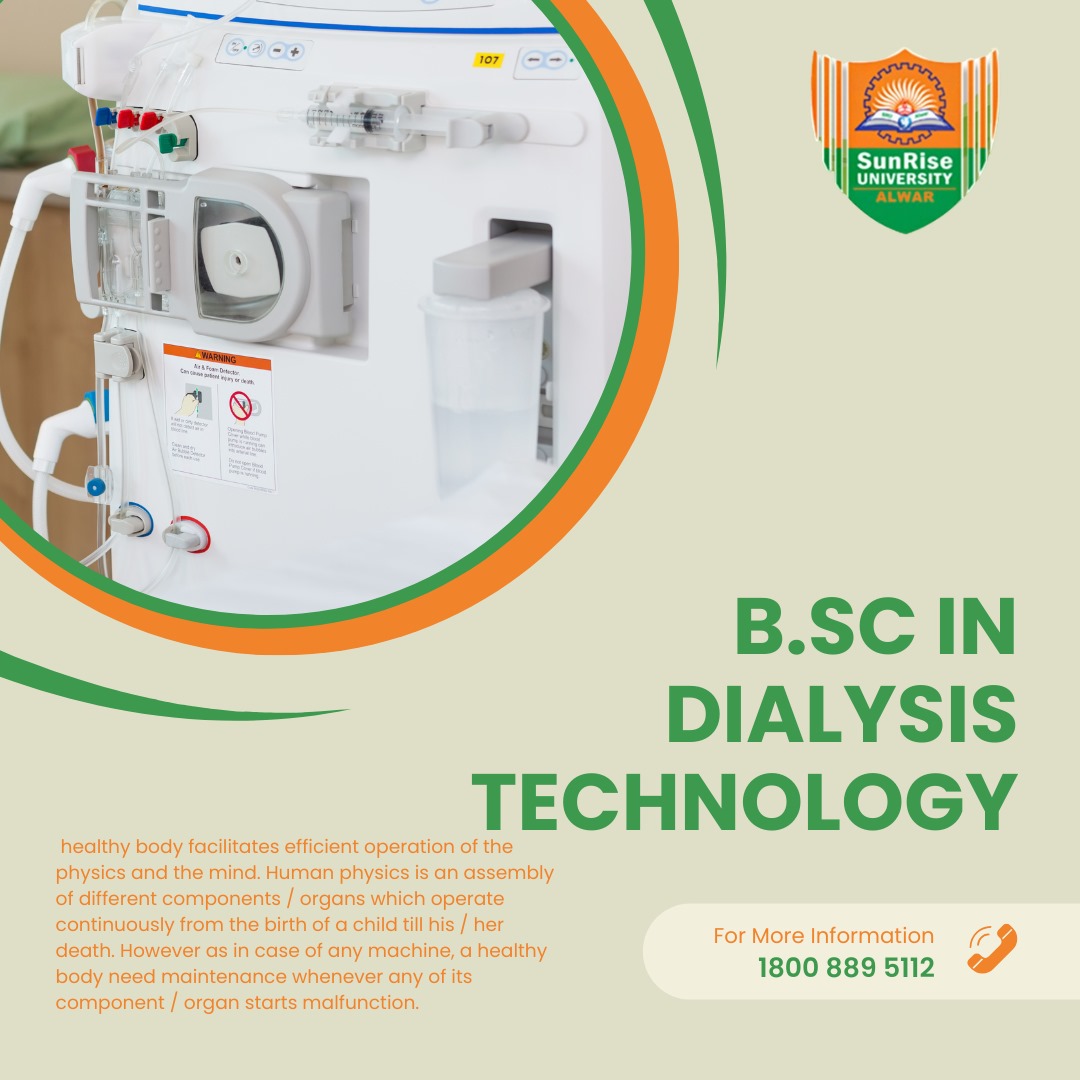Introduction about (B.Sc.) in Dialysis Technology
Sunrise University: (B.Sc.) in Dialysis Technology
Introduction, Admission, Eligibility, Duration
This introduction provides a glimpse into the B.Sc. in Dialysis Technology program, designed by the best University of India highlighting its curriculum, skills development, clinical training, career prospects, and significance in the healthcare sector. A Bachelor of Science (B.Sc.) in Dialysis Technology is a specialized undergraduate program designed to train students in the field of renal care and dialysis procedures.
How can I apply for admission to the (B.Sc.) in Dialysis Technology?
-
Research Programs: Start by researching universities or colleges that offer B.Sc. programs in Dialysis Technology. Look for institutions with good reputations and accreditation for healthcare-related programs.
-
Check Eligibility: Review the eligibility criteria for the program. This may include educational qualifications such as completing high school with relevant science subjects (biology, chemistry, physics) and meeting any minimum GPA requirements.
-
Application Form: Obtain the application form from the university or college where you wish to apply. This can usually be done online through the institution's website.
-
Submit Documents: Gather the necessary documents, which typically include:
-
High school transcripts or equivalent certificates
-
Standardized test scores (if required)
-
Letters of recommendation (if required)
-
Personal statement or essay explaining your interest in Dialysis Technology
-
Any other documents specified by the institution
-
Application Fee: Pay the application fee, if applicable, when submitting your application.
-
Entrance Exam: Some institutions may require you to take an entrance exam as part of the admission process. Prepare for and take any required exams.
-
Interview: In some cases, you may be called for an interview as part of the selection process. Prepare for the interview by researching the program and being ready to discuss your interest in Dialysis Technology.
-
Submit Application: Complete the application process by submitting all required documents, paying the fees, and following any additional instructions provided by the institution.
-
Wait for Admission Decision: After submitting your application, wait for the admission committee to review your application. You will be notified of the admission decision through email or mail.
-
Acceptance and Enrolment: If accepted, follow the instructions provided to accept the offer of admission and complete the enrolment process, including payment of any tuition fees and registration for classes.
What is the eligibility for the (B.Sc.) in Dialysis Technology?
-
Educational Qualifications: Candidates should have completed a 10+2 or equivalent examination from a recognized board or institution with Physics, Chemistry, and Biology as compulsory subjects.
-
Minimum Marks: Most institutions require candidates to have a minimum aggregate of around 50% to 60% marks in their 10+2 examination. However, the exact percentage requirement may vary between institutions.
-
Entrance Exams: Some universities or colleges may conduct entrance exams for admission into the B.Sc. Dialysis Technology program. Candidates may need to qualify for these exams to be eligible for admission.
-
Age Limit: There might be an age limit specified by the institution for admission to this program. Generally, candidates should be within the age limit prescribed by the university or college.
-
Additional Requirements: Depending on the institution, there may be additional requirements such as medical fitness certificates or other specific criteria.
How long does it take to complete the (B.Sc.) in Dialysis Technology?
A Bachelor of Science (B.Sc.) in Dialysis Technology program at the best University of India typically takes about 3 to 4 years to complete. The exact duration may vary slightly depending on the institution and the specific curriculum they offer. It's always a good idea to check with the university or college offering the program for the most accurate information on the duration of their B.Sc. in Dialysis Technology.
Internship opportunities after the (B.Sc.) in Dialysis Technology?
-
Dialysis Centres: Many dialysis centres offer internships for students to gain hands-on experience in operating dialysis machines, monitoring patients during dialysis sessions, and managing patient care.
-
Hospitals: Large hospitals with nephrology departments often have internship programs for dialysis technologists. Interns may work in dialysis units, collaborate with nephrologists and nurses, and learn about different dialysis modalities.
-
Nephrology Clinics: Specialized clinics focusing on kidney diseases and dialysis treatment may offer internships to B.Sc. in Dialysis Technology graduates. Interns can learn about outpatient dialysis services and patient management.
-
Research Institutions: Some research institutions or universities with nephrology departments may provide internships for students interested in dialysis technology research. This could involve studying new dialysis techniques, equipment, or patient outcomes.
-
Home Dialysis Providers: Companies that provide home dialysis equipment and services may offer internships to students interested in home-based dialysis care. Interns may learn about home dialysis machine maintenance, patient education, and remote monitoring.
-
Industry Internships: Pharmaceutical companies, medical device manufacturers, and healthcare technology firms may have internships related to dialysis technology. These internships could focus on product development, marketing, or clinical support.






